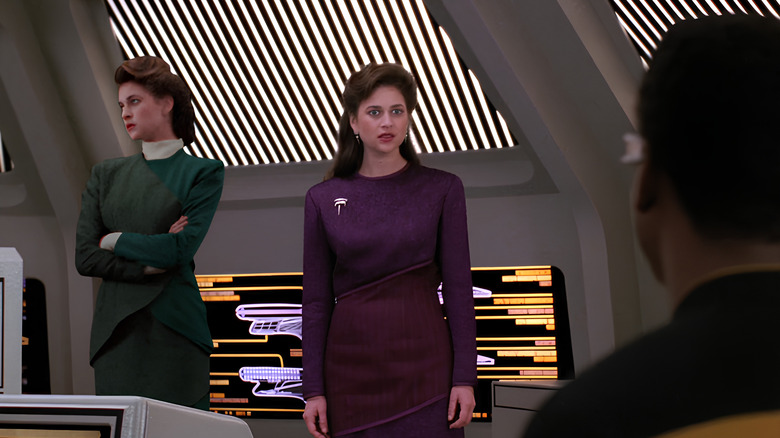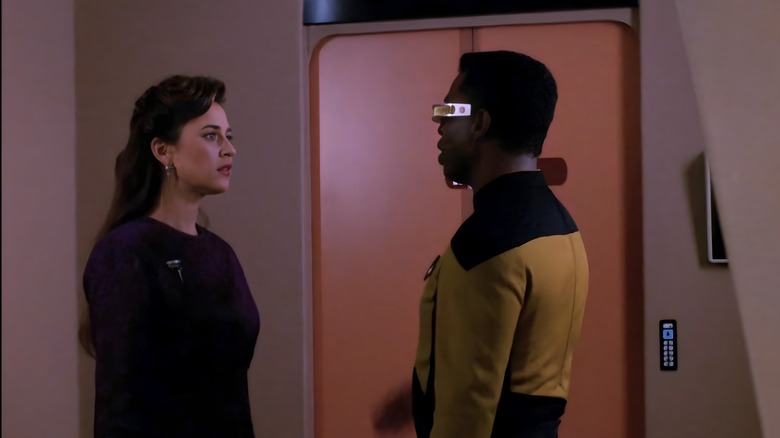Star Trek: The Creepy Susan Gibney Storyline That Wouldn't Fly Today
Actor Susan Gibney may be recognizable to many from her role as Maggie Harris on "Happy Family," but to "Star Trek" fans, she's better known as a genius scientist. Gibney appeared in several episodes of "Star Trek: The Next Generation," on which she played Doctor Leah Brahms, one of the major designers of the Enterprise's warp engines. But while Brahms' storyline involved issues that feel even more relevant today thanks to emerging technologies, it delivered a message that seems to condone odious behavior from none other than Geordi La Forge (LeVar Burton).
In the Season 3 episode "Booby Trap," the Enterprise finds itself caught in a trap while exploring an abandoned ship. Meanwhile, La Forge is having romantic issues, having been rebuffed after a date with crewmate Christy Henshaw (Julie Warner). Later, La Forge consults the ship's computer to search for a way out of the trap, where he finds a digital recreation of Brahms. At first, he only asks for her hologram's scientific opinion regarding the present danger, but he later adds her personality to the recreation. Eventually, the two share a kiss. Of course, none of this was done with the real Brahms' knowledge, which gives their romance a creepy overtone.
In the episode "Galaxy's Child," Brahms visits the Enterprise and discovers La Forge's Holodeck program, telling him, "I have been invaded, violated!" The engineer responds by castigating her. After the two are forced to work together on the problem at hand, she ends up apologizing to him for her reaction. Although the episode points out via Guinan (Whoopi Goldberg) that La Forge has constructed a fantasy in place of a person, the way the story plays out implies that his violation of her privacy and consent is acceptable. It veers uncomfortably close to endorsing his behavior.
Episodes featuring Gibney's Leah Brahms let creepy behavior off the hook
In the decades since "Booby Trap" and "Galaxy's Child" aired, it's clear that Geordi La Forge's replication of Dr. Leah Brahms and the romance he created were never acceptable. In a 2012 review of the latter episode for Tor, Keith R.A. DeCandido wrote, "... they've turned La Forge into an unrepentant virtual rapist," concluding, "this episode shines a light on something awful one of the main characters did, and instead of making him pay for it, rewards him and tells him it's okay. That's morally reprehensible." Since that review was published, new technology has thrown the episodes' misguidedness into even harsher relief.
In our era of artificial intelligence, a world in which other people can be convincingly replicated by a computer feels like a very near possibility. Already, deepfake technology can replicate a person's voice and face with near-pinpoint accuracy. In other words, we are already stepping into the ethical minefield around consent such technologies present.
In brushing off La Forge's invasion of Brahms' privacy and consent, "Star Trek: The Next Generation" appears to suggest that while such actions may be creepy, they're ultimately not a big deal. But as those who have already found themselves the victim of deepfake pornography and other digital breaches of consent can attest, such incidents are extremely violating and traumatizing. Per Teen Vogue, many women who have suffered such abuse are seeking the passage of federal legislation to criminalize unauthorized deepfakes.
Although Gibney is a delight to witness in both episodes, it's clear "Star Trek" went too far with their erroneously framed narratives.
If you or anyone you know has been a victim of sexual assault, help is available. Visit the Rape, Abuse & Incest National Network website or contact RAINN's National Helpline at 1-800-656-HOPE (4673).

